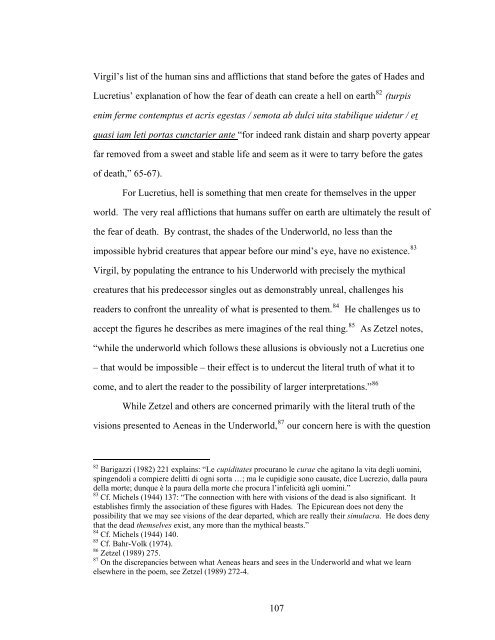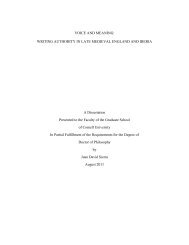Dissertation FINAL2.pdf - Cornell University
Dissertation FINAL2.pdf - Cornell University
Dissertation FINAL2.pdf - Cornell University
Create successful ePaper yourself
Turn your PDF publications into a flip-book with our unique Google optimized e-Paper software.
Virgil’s list of the human sins and afflictions that stand before the gates of Hades and<br />
Lucretius’ explanation of how the fear of death can create a hell on earth 82 (turpis<br />
enim ferme contemptus et acris egestas / semota ab dulci uita stabilique uidetur / et<br />
quasi iam leti portas cunctarier ante “for indeed rank distain and sharp poverty appear<br />
far removed from a sweet and stable life and seem as it were to tarry before the gates<br />
of death,” 65-67).<br />
For Lucretius, hell is something that men create for themselves in the upper<br />
world. The very real afflictions that humans suffer on earth are ultimately the result of<br />
the fear of death. By contrast, the shades of the Underworld, no less than the<br />
impossible hybrid creatures that appear before our mind’s eye, have no existence. 83<br />
Virgil, by populating the entrance to his Underworld with precisely the mythical<br />
creatures that his predecessor singles out as demonstrably unreal, challenges his<br />
readers to confront the unreality of what is presented to them. 84<br />
He challenges us to<br />
accept the figures he describes as mere imagines of the real thing. 85<br />
As Zetzel notes,<br />
“while the underworld which follows these allusions is obviously not a Lucretius one<br />
– that would be impossible – their effect is to undercut the literal truth of what it to<br />
come, and to alert the reader to the possibility of larger interpretations.” 86<br />
While Zetzel and others are concerned primarily with the literal truth of the<br />
visions presented to Aeneas in the Underworld, 87 our concern here is with the question<br />
82 Barigazzi (1982) 221 explains: “Le cupiditates procurano le curae che agitano la vita degli uomini,<br />
spingendoli a compiere delitti di ogni sorta …; ma le cupidigie sono causate, dice Lucrezio, dalla paura<br />
della morte; dunque è la paura della morte che procura l’infelicità agli uomini.”<br />
83 Cf. Michels (1944) 137: “The connection with here with visions of the dead is also significant. It<br />
establishes firmly the association of these figures with Hades. The Epicurean does not deny the<br />
possibility that we may see visions of the dear departed, which are really their simulacra. He does deny<br />
that the dead themselves exist, any more than the mythical beasts.”<br />
84 Cf. Michels (1944) 140.<br />
85 Cf. Bahr-Volk (1974).<br />
86 Zetzel (1989) 275.<br />
87 On the discrepancies between what Aeneas hears and sees in the Underworld and what we learn<br />
elsewhere in the poem, see Zetzel (1989) 272-4.<br />
107
















